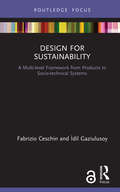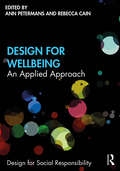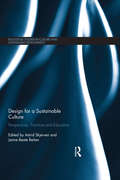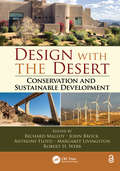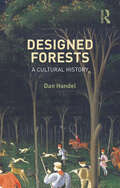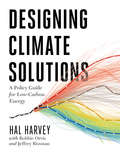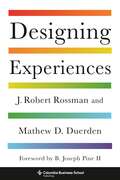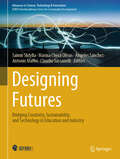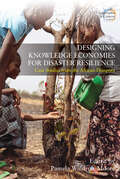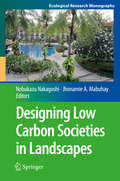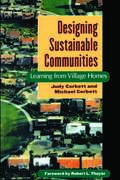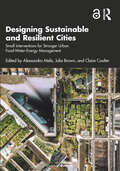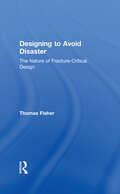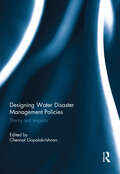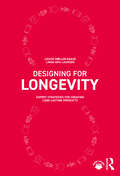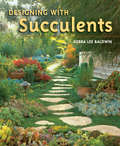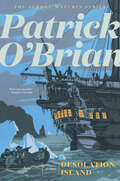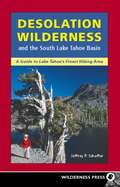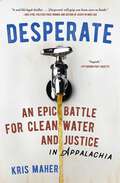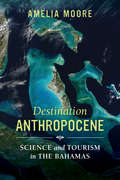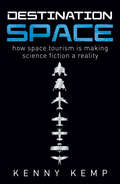- Table View
- List View
Design for Sustainability: A Multi-level Framework from Products to Socio-technical Systems (Routledge Focus on Environment and Sustainability)
by Fabrizio Ceschin İdil GaziulusoyThis book discusses the most significant ways in which design has been applied to sustainability challenges using an evolutionary perspective. It puts forward an innovation framework that is capable of coherently integrating multiple design for sustainability (DfS) approaches developed so far. It is now widely understood that design can and must play a crucial role in the societal transformations towards sustainability. Design can in fact act as a catalyst to trigger and support innovation, and can help to shape the world at different levels: from materials to products, product–service systems, social organisations and socio-technical systems. This book offers a unique perspective on how DfS has evolved in the past decades across these innovation levels, and provides insights on its promising and necessary future development directions. For design scholars, this book will trigger and feed the academic debate on the evolution of DfS and its next research frontiers. For design educators, the book can be used as a supporting tool to design courses and programmes on DfS. For bachelor’s and master’s level design, engineering and management students, the book can be a general resource to provide an understanding of the historical evolution of DfS. For design practitioners and businesses, the book offers a rich set of practical examples, design methods and tools to apply the various DfS approaches in practice, and an innovation framework which can be used as a tool to support change in organisations that aim to integrate DfS in their strategy and processes.
Design for Wellbeing: An Applied Approach (Design for Social Responsibility)
by Ann Petermans Rebecca CainDesign for Wellbeing charts the development and application of design research to improve the personal and societal wellbeing and happiness of people. It draws together contributions from internationally leading academics and designers to demonstrate the latest thinking and research on the design of products, technologies, environments, services and experiences for wellbeing. Part I starts by conceptualising wellbeing and takes an in-depth look at the rise of the design for wellbeing movement. Part II then goes on to demonstrate design for wellbeing in practice through a broad range of domains from products and environments to services. Among others, we see emerging trends in the design of interiors and urban spaces to support wellbeing, designing to enable and support connectedness and social interaction, and designing for behaviour change to tackle unhealthy eating behaviour in children. Significantly, the body of work on subjective wellbeing, design for happiness, is increasing, and several case studies are provided on this, demonstrating how design can contribute to support the wellbeing of people. Part III provides practical guidance for designing for wellbeing through a range of examples of tools, methods and approaches, which are highly user-centric, participatory, critical and speculative. Finally, the book concludes in Part IV with a look at future challenges for design for wellbeing. This book provides students, researchers and practitioners with a detailed assessment of design for wellbeing, taking a distinctive global approach to design practice and theory in context. Design for Wellbeing concerns designers and organisations but also defines its broader contribution to society, culture and economy.
Design for a Sustainable Culture: Perspectives, Practices and Education (Routledge Studies in Culture and Sustainable Development)
by Astrid Skjerven Janne ReitanAs culture is becoming increasingly recognised as a crucial element of sustainable development, design competence has emerged as a useful tool in creating a meaningful life within a sustainable mental, cultural and physical environment. Design for a Sustainable Culture explores the relationship between sustainability, culture and the shaping of human surroundings by examining the significance and potential of design as a tool for the creation of sustainable development. Drawing on interdisciplinary case studies and investigations from Europe, North America and India, this book discusses theoretical, methodological and educational aspects of the role of design in relation to human well-being and provides a unique perspective on the interface between design, culture and sustainability. This book will appeal to researchers as well as postgraduate and undergraduate students in design and design literacy, crafts, architecture and environmental planning, but also scholars of sustainability from other disciplines who wish to understand the role and impact of design and culture in sustainable development.
Design of Thermal Oxidation Systems for Volatile Organic Compounds
by David A LewandowskiControlling the emission of volatile organic compounds (VOC) became a very prominent environmental issue with the passage of the 1990 Clean Air Act Amendments, and will continue to be an environmental priority through the next decade. No single technology has played as important a role in the control of VOC emissions as thermal oxidation. It has the ability to destroy VOCs in a one-step process that produces innocuous by-products.Design of Thermal Oxidation Systems for Volatile Organic Compounds provides all the information needed for developing a thermal oxidation design in a single reference. It covers design, operation, and maintenance as well as the principles behind the classification of volatile organic compounds as hazardous waste. The author explores the primary purpose of thermal oxidizers and discusses their limitations.The book provides:practical, complete, and concise thermal oxidizer design principlesan outline of state-of-the-art design principlesa practical rather than theoretical approachreal industrial examples in each chapterWith the new regulations that affect VOC emissions, engineers from such diverse fields as oil refining, chemical distillation and separation processes, and pharmaceutical industries will need to design and implement thermal oxidation systems. Design of Thermal Oxidation Systems for Volatile Organic Compounds provides a reference to the entire design process, from conceptualization to operation and maintenance.
Design with the Desert: Conservation and Sustainable Development
by Richard MalloyTypical development in the American Southwest often resulted in scraping the desert lands of the ancient living landscape, to be replaced with one that is human-made and dependent on a large consumption of energy and natural resources. This transdisciplinary book explores the natural and built environment of this desert region and introduces development tools for shaping its future in a more sustainable way. It offers valuable insights to help promote ecological balance between nature and the built environment in the American Southwest-and in other ecologically fragile regions around the world.
Designed Forests: A Cultural History
by Dan HandelDesigned Forests: A Cultural History explores the unique kinship that exists between forests and spatial design; the forest’s influence on architectural culture and practice; and the potentials and pitfalls of “forest thinking” for more sustainable and ethical ways of doing architecture today. It tackles these subjects by focusing on architecture’s own dispositions, which stem from an ecology of metaphor that surrounds its encounters with the forest and undergird ideas about Nature and natural systems. The book weaves together global narratives and chapters explore a range of topics, such as the invention of forest plans in colonial India, the war waged on the jungles of Vietnam, economic land use concepts in rural Germany, precolonial ecological pasts in Manhattan, and technologically saturated forests in California. This book is essential for landscape architects, urbanists, architects, forestry experts, and everyone concerned with larger environmental contexts and the ever-evolving relationship between nature and culture.
Designing Climate Solutions: A Policy Guide for Low-Carbon Energy
by Hal Harvey Robbie Orvis Jeffrey RissmanWith the effects of climate change already upon us, the need to cut global greenhouse gas emissions is nothing less than urgent. It's a daunting challenge, but the technologies and strategies to meet it exist today. A small set of energy policies, designed and implemented well, can put us on the path to a low carbon future. Energy systems are large and complex, so energy policy must be focused and cost-effective. One-size-fits-all approaches simply won't get the job done. Policymakers need a clear, comprehensive resource that outlines the energy policies that will have the biggest impact on our climate future, anddescribes how to design these policies well.Designing Climate Solutions:A Policy Guide for Low-Carbon Energy is the first such guide, bringing together the latest research and analysis around low carbon energy solutions. Written by Hal Harvey, CEO of the policy firm Energy Innovation, with Robbie Orvis and Jeffrey Rissman of Energy Innovation, Designing Climate Solutions is an accessible resource on lowering carbon emissions for policymakers, activists, philanthropists, and others in the climate and energy community. In Part I, the authors deliver a roadmap for understanding which countries, sectors, and sources produce the greatest amount of greenhouse gas emissions, and give readers the tools to select and design efficient policies for each of these sectors. In Part II, they break down each type of policy, from renewable portfolio standards to carbon pricing, offering key design principles and case studies where each policy has been implemented successfully.We don't need to wait for new technologies or strategies to create a low carbon future—and we can't afford to. Designing Climate Solutions gives professionals the tools they need to select, design, and implement the policies that can put us on the path to a livable climate future.
Designing Experiences: Designing Leisure Experiences: 5th Edition (Columbia Business School Publishing Ser.)
by J. Robert Rossman Mathew D. DuerdenIn an increasingly experience-driven economy, companies that deliver great experiences thrive, and those that do not die. Yet many organizations face difficulties implementing a vision of delivering experiences beyond the provision of goods and services. Because experience design concepts and approaches are spread across multiple, often disconnected disciplines, there is no book that succinctly explains to students and aspiring professionals how to design them.J. Robert Rossman and Mathew D. Duerden present a comprehensive and accessible introduction to experience design. They synthesize the fundamental theories and methods from multiple disciplines and lay out a process for designing experiences from start to finish. Rossman and Duerden challenge us to reflect on what makes a great experience from the user’s perspective. They provide a framework of experience types, explaining people’s engagement with products and services and what makes experiences personal and fulfilling. The book presents interdisciplinary research underlying key concepts such as memory, intentionality, and dramatic structure in a down-to-earth style, drawing attention to both the macro and micro levels. Designing Experiences features detailed instructions and numerous real-world examples that clarify theoretical principles, making it useful for students and professionals. An invaluable overview of a growing field, the book provides readers with the tools they need to design innovative and indelible experiences and to move their organizations into the experience economy.Designing Experiences features a foreword by B. Joseph Pine II.
Designing Futures: Bridging Creativity, Sustainability, and Technology in Education and Industry (Advances in Science, Technology & Innovation)
by Angeles Sánchez Marina Checa Olivas Saimir Shtylla Antonio Maffei Claudio SassanelliThis book is a compelling exploration into the integration of sustainability with creativity and technology. It offers a cohesive journey from theoretical insights into practical applications across creative disciplines, education, and industries. This book serves as a crucial guide for those looking to navigate the challenges of modern sustainability through innovative solutions. By showcasing examples from 3D printing in education to sustainable practices in creative industries and the preservation of cultural heritage through digital innovation, it highlights the transformative power of creativity in fostering a sustainable future. Aimed at academics, professionals, and students, this book is an invitation to engage, innovate, and contribute to the sustainability discourse in the creative sectors.
Designing Knowledge Economies for Disaster Resilience: Case Studies from the African Diaspora (Catastrophes in Context #7)
by Pamela Waldron-MooreDisaster research has been studied from many angles, seldom targeting its implications for vulnerable territories in Africa. Entities most subject to the effects of climate change are often undeveloped and located in disadvantaged regions. Post-disaster communities need to scrutinize the social, political, economic, and cultural structures that stagnate sustainable growth. Acknowledging that low economic development and high climate costs cannot coexist, this collected volume interrogates the challenge for disaster-prone territories to determine strategies for restructuring and redesigning their environment. This book proposes the creation of knowledge economies, whereby empowered communities may produce innovative knowledge translatable across the African diaspora.
Designing Low Carbon Societies in Landscapes
by Nobukazu Nakagoshi Jhonamie A. MabuhayThis book focuses on three major means of achieving a low carbon society: conservation of the ecosystem complex, changes of arrangement of landscapes, and creation of biodiversity. There are specific countermeasures to be taken for carbon absorption in the three types of landscapes--urban, cultural, and natural--because their carbon balances differ. Urban landscapes are promising sites because they have the potential for greening and the creation of biodiversity. Cultural landscapes in the tropics had not been actively researched until recently, but this book now presents a collection of several cases focused on those areas. Natural landscapes had existed in abundance in developing countries; later, nature protection areas were designated to coexist with development. Now, however, developmental pressure has penetrated into those nature protection areas, and landscape ecological projects are urgently required to preserve them. As a result of global warming, abnormal weather phenomena including super typhoons have occurred frequently in recent years. The major underlying cause is the higher concentration of greenhouse gases released by human activities. As well, major natural absorbers of CO2 such as forests, wetlands, and coral reefs are shrinking, and the human impact is causing the ecological balance to deteriorate. Controlling CO2 emissions and expanding the CO2 absorbers are keys to reducing total CO2. Low carbon societies can be established by maintaining the original CO2 balance through integration of multiple tools, with contributions from diverse fields such as physics and chemistry, physiology and humanities, and education. On the basis of an international consensus, the environment must be protected no matter what sacrifices are required. As this book demonstrates, achieving a low carbon society is a top priority, and landscape conservation is the first step in ecological research toward that goal.
Designing Sustainable Communities: Learning From Village Homes
by Robert L. Thayer Michael Corbett Judy CorbettThe movement toward creating more sustainable communities has been growing for decades, and in recent years has gained new prominence with the increasing visibility of planning approaches such as the New Urbanism. Yet there are few examples of successful and time-tested sustainable communities.Village Homes outside of Davis, California offers one such example. Built between 1975 and 1981 on 60 acres of land, it offers unique features including extensive common areas and green space; community gardens, orchards, and vineyards; narrow streets; pedestrian and bike paths; solar homes; and an innovative ecological drainage system. Authors Judy and Michael Corbett were intimately involved with the design, development, and building of Village Homes, and have resided there since 1977.In Designing Sustainable Communities, they examine the history of the sustainable community movement and discuss how Village Homes fits into the context of that movement. They offer an inside look at the development of the project from start to finish, describing how the project came about, obstacles that needed to be overcome, design approaches they took, problems that were encountered and how those problems were solved, and changes that have occurred over the years. In addition, they compare Village Homes with other communities and developments across the country, and discuss the future prospects for the continued growth of the sustainable communities movement.The book offers detailed information on a holistic approach to designing and building successful communities. It represents an invaluable guide for professionals and students involved with planning, architecture, development, and landscape architecture, and for anyone interested increating more sustainable communities.
Designing Sustainable and Resilient Cities: Small Interventions for Stronger Urban Food-Water-Energy Management
by Alessandro Melis Julia Brown Claire CoulterThis book explores the link between the Food-Water-Energy nexus and sustainability, and the extraordinary value that small tweaks to this nexus can achieve for more resilient cities and communities. Using data from Urban Living Labs in six participating cities (Eindhoven, Gdańsk, Miami, Southend-on-Sea, Taipei, and Uppsala) to co-define context-specific challenges, the results from each city are collated into an Integrated Decision Support System to guide and improve robust decision-making on future urban development. The book presents contributions from CRUNCH, a transdisciplinary team of scholars and practitioners whose expertise spans urban climate modelling; food, water, and energy management; the design of resilient public space; collecting better urban data; and the development of smart city technology. Whilst previous works on the Food-Water-Energy nexus have focused on large, transnational cases, this book explores local ways to use the Food-Water-Energy nexus to improve urban resilience. It suggests tangible ways in which the cities and communities around us can become both more efficient and more climate resilient through small changes to their existing infrastructure. Over half of the world’s population lives in urban areas, and this is expected to increase to 68% by 2050. We urgently need to make our cities more resilient. This book provides a planning tool for decision-making and concludes with policy recommendations, making it relevant to a range of audiences including urbanists, environmentalists, architects, urban designers, and city planners, as well as students and scholars interested in alternative approaches to sustainability and resilience. Chapter 2 of this book is freely available as a downloadable Open Access PDF at http://www.taylorfrancis.com under a Creative Commons Attribution-Non Commercial-No Derivatives (CC-BY-NC-ND) 4.0 license.
Designing To Avoid Disaster: The Nature of Fracture-Critical Design
by Thomas FisherRecent catastrophic events, such as the I-35W bridge collapse, New Orleans flooding, the BP oil spill, Port au Prince's destruction by earthquake, Fukushima nuclear plant's devastation by tsunami, the Wall Street investment bank failures, and the housing foreclosure epidemic and the collapse of housing prices, all stem from what author Thomas Fisher calls fracture-critical design. This is design in which structures and systems have so little redundancy and so much interconnectedness and misguided efficiency that they fail completely if any one part does not perform as intended. If we, as architects, planners, engineers, and citizens are to predict and prepare for the next disaster, we need to recognize this error in our thinking and to understand how design thinking provides us with a way to anticipate unintended failures and increase the resiliency of the world in which we live. In Designing to Avoid Disaster, the author discusses the context and cultural assumptions that have led to a number of disasters worldwide, describing the nature of fracture-critical design and why it has become so prevalent. He traces the impact of fracture-critical thinking on everything from our economy and politics to our educational and infrastructure systems to the communities, buildings, and products we inhabit and use everyday. And he shows how the natural environment and human population itself have both begun to move on a path toward a fracture-critical collapse that we need to do everything possible to avoid. We designed our way to such disasters and we can design our way out of them, with a number of possible solutions that Fisher provides.
Designing Water Disaster Management Policies: Theory and Empirics
by Chennat GopalakrishnanThis book represents a landmark effort to probe and analyze the theory and empirics of designing water disaster management policies. It consists of seven chapters that examine, in-depth and comprehensively, issues that are central to crafting effective policies for water disaster management. The author uses historical surveys, institutional analysis, econometric investigations, empirical case studies, and conceptual-theoretical discussions to clarify and illuminate the complex policy process.The specific topics studied in this book include a review and analysis of key policy areas and research priority areas associated with water disaster management, community participation in disaster risk reduction, the economics and politics of ‘Green’ flood control, probabilistic flood forecasting for flood risk management, polycentric governance and flood risk management, drought management with the aid of dynamic inter-generational preferences, and how social resilience can inform SA/SIA for adaptive planning for climate change in vulnerable areas.A unique feature of this book is its analysis of the causes and consequences of water disasters and efforts to address them successfully through policy-rich, cross-disciplinary and transnational papers. This book is designed to help enrich the sparse discourse on water disaster management policies and galvanize water professionals to craft creative solutions to tackle water disasters efficiently, equitably, and sustainably. This book should also be of considerable use to disaster management professionals, in general, and natural resource policy analysts.This book was published as a special issue of the Journal of Natural Resource Policy Research.
Designing for Longevity: Expert Strategies for Creating Long-Lasting Products
by Louise Møller Haase Linda Nhu LaursenProduct longevity is one of the cornerstones in the transition towards a more sustainable society and a key driver for the circular economy model. This book provides designers, developers, and creators with five distinctive expert strategies, detailed case studies, action guides and worksheets that support both beginning and advanced design practitioners in creating new product concepts with long-lasting strategic fits. Designing for Longevity shows how expert design teams create original and long-lasting product concepts from the early development phase. It focuses on integrating business knowledge, market conditions, company capabilities, technical possibilities and user needs into product concepts to make better strategic decisions. It demonstrates how, for products to be durable, designers must create a long-lasting strategic fit for the customer, company, and market. Key case studies of products such as Bang & Olufsen’s A9, LEGO Ninjago and Friends and Coloplasts’ Sensura Mio, among others, offer readers inspiration, guidance and real-world insights from design teams showing how the strategies can be applied in practice. Action guidelines and worksheets encourage broad, analytical problem-solving to identify and think through challenges at the early concept stage. Beautifully designed and illustrated in full colour throughout, this book combines original research and the hands-on tools and strategies that design practitioners need to create useful, sustainable products.
Designing with Dried Flowers: Creating Everlasting Arrangements
by Hannah Rose MullerStep into the world of beautiful, everlasting flowers with this book of thirty-two dried flower arrangements that can be made all year round.Flowers are often fleetingly lovely, but a dried bouquet is a gift that can last. In Designing with Dried Flowers, you&’ll find small arrangements for every day, beautiful wreaths for every season and occasion, and celebration showstoppers that will look gorgeous in the moment and for months to come. Farmer-florist Hannah Muller of The Wreath Room at Full Belly Farm shares her unique methods to naturally dry flowers that hold their color and delicacy. Alongside the arrangements you&’ll learn how to dry your own flowers, whether they&’re from the supermarket or your garden. From there, create one of the many unique arrangements in the book, and easily create new ones with the same flowers. With step-by-step instructions for every arrangement, gorgeous photography to inspire your creations, and helpful information along the way, Designing with Dried Flowers is a must-have for every flower lover.
Designing with Succulents: 10th Anniversary Edition
by Debra Lee BaldwinLavishly illustrated with over 300 photographs, Designing with Succulents gives design and cultivation basics for paths, borders, slopes, and containers; hundreds of succulent plant recommendations; and descriptions of 90 easy-care, drought-tolerant companion plants. Beginners and experienced designers, landscapers, and collectors alike will find what they need to visualize, create, and nurture the three-dimensional work of art that is the succulent garden.
Designing with Succulents: Create A Lush Garden Of Waterwise Plants
by Debra Lee Baldwin“Designing with Succulents is inspiring, practical, and complete—a treasure for any gardener who loves these otherworldly beauties.” —Kathleen N. Brenzel, Sunset Succulents offer dazzling possibilities and require only minimal maintenance and very little water to remain lush and alluring year-round. No one knows them better than the Queen of Succulents, Debra Lee Baldwin. This new, completely revised second edition of her bestselling classic is a design compendium that is as practical as it is inspirational. Designing with Succulents shares design and cultivation basics; hundreds of succulent plant recommendations; and profiles of 50 easy-care, drought-tolerant companion plants. Lavishly illustrated with 400 photographs, you will find everything you need to visualize, create, and nurture a thriving, water-smart succulent garden.
Desolation Island (Aubrey/Maturin Novels #5)
by Patrick O'Brian"The relationship [between Aubrey and Maturin]...is about the best thing afloat....For Conradian power of description and sheer excitement there is nothing in naval fiction to beat the stern chase as the outgunned Leopard staggers through mountain waves in icy latitudes to escape the Dutch seventy-four."—Stephen Vaughan, Observer Commissioned to rescue Governor Bligh of Bounty fame, Captain Jack Aubrey and his friend and surgeon Stephen Maturin sail the Leopard to Australia with a hold full of convicts. Among them is a beautiful and dangerous spy—and a treacherous disease that decimates the crew. With a Dutch man-of-war to windward, the undermanned, outgunned Leopard sails for her life into the freezing waters of the Antarctic, where, in mountain seas, the Dutchman closes...
Desolation Wilderness
by Jeffrey P. SchafferThis is the most comprehensive guidebook to Lake Tahoe's finest hiking area. It offers you: 32 accurately described hiking trips in four areas: Desolation Wilderness, Lake Tahoe's Emerald Bay, South Fork American River (trails south of Highway 50), and Upper Truckee River (trails north of Highway 88 and west of Highway 89).
Desperate: An Epic Battle for Clean Water and Justice in Appalachia
by Kris MaherSet in Appalachian coal country, this &“superb&” (Pittsburgh Post-Gazette) legal drama follows one determined lawyer as he faces a coal industry giant in a seven-year battle over clean drinking water for a West Virginia community.For two decades, the water in the taps and wells of Mingo County didn&’t look, smell, or taste right. Could the water be the root of the health problems—from kidney stones to cancer—in this Appalachian community? Environmental lawyer Kevin Thompson certainly thought so. For seven years, Thompson waged an epic legal battle against Massey Energy, West Virginia&’s most powerful coal company, helmed by CEO Don Blankenship. While Massey&’s lawyers worked out of a gray glass office tower in Charleston known as &“the Death Star,&” Thompson set up shop in a ramshackle hotel in the fading coal town of Williamson. Working with fellow lawyers and a crew of young activists, Thompson would eventually uncover the ruthless shortcuts that put the community&’s drinking water at risk. Retired coal miners, women whose families had lived in the area&’s coal camps for generations, a respected preacher and his brother, all put their trust in Thompson when they had nowhere else to turn. Desperate is a masterful work of investigative reporting about greed and denial, &“both a case study in exploitation of the little guy and a playbook for confronting it&” (Kirkus Reviews). Maher crafts a revealing portrait of a town besieged by hardship and heartbreak, and an inspiring account of one tenacious environmental lawyer&’s mission to expose the truth and demand justice.
Dessert Island
by Ben ZhuBen Zhu's Dessert Island is an irresistible picture book about sharing and caring.Monkey is on a dessert island. It is made of frosting, berries, and other delicious things. Fox is on a desert island. It is made of dirt, rocks, and sand.But as time goes on, their fortunes change, and Monkey and Fox discover that no animal is an island.This wonderfully layered story has themes of consumption and conservation at its center, and wraps up with a sweet and satisfying ending.
Destination Anthropocene: Science and Tourism in The Bahamas (Critical Environments: Nature, Science, and Politics #7)
by Amelia MooreDestination Anthropocene documents the emergence of new travel imaginaries forged at the intersection of the natural sciences and the tourism industry in a Caribbean archipelago. Known to travelers as a paradise of sun, sand, and sea, The Bahamas is rebranding itself in response to the rising threat of global environmental change, including climate change. In her imaginative new book, Amelia Moore explores an experimental form of tourism developed in the name of sustainability, one that is slowly changing the way both tourists and Bahamians come to know themselves and relate to island worlds.
Destination Space: Making Science Fiction a Reality
by Kenny KempAward-winning writer and journalist Kenny Kemp goes in search of the paying passengers who will make history on the first commercial flight into space. They will be able to experience weightlessness, witness the curvature of the Earth and have a unique view of the Universe seen only by astronauts. Detailing their arduous training and how their bodies will be affected in space, to the science, business and politics behind this incredible breakthrough, Destination Space describes just the beginning of an amazing adventure . . .
